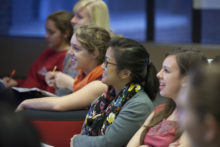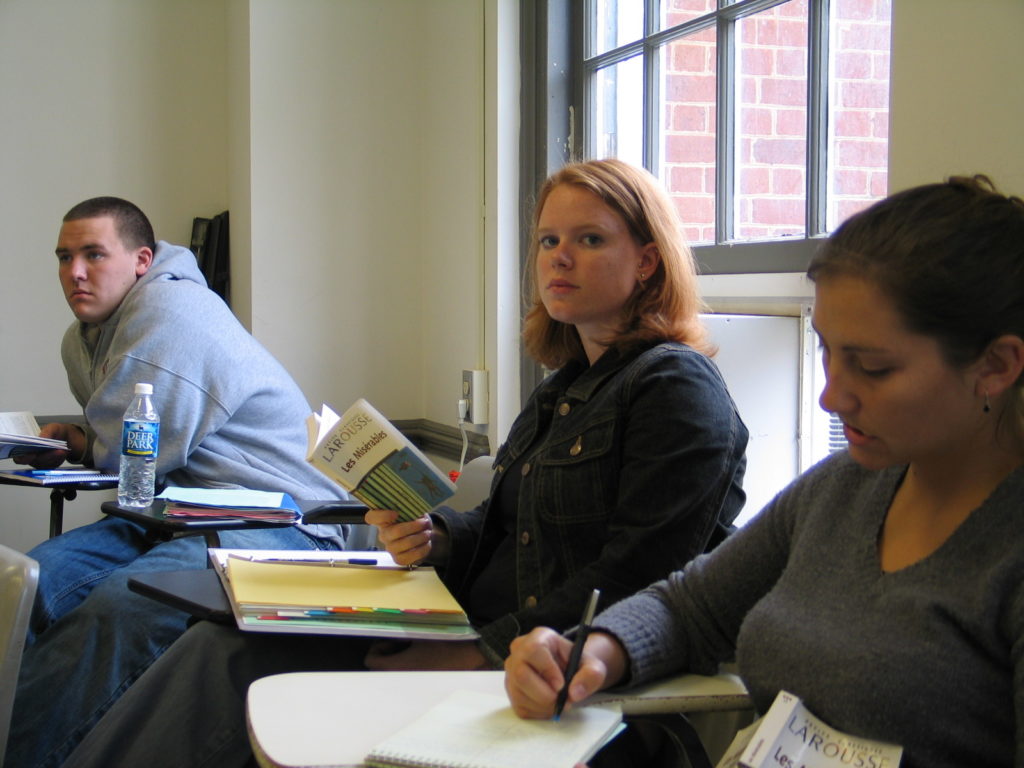Over the years, I more and more respect people for what they know and can learn, and for their energy, imagination, and creativity. So whether I am teaching literature, language, or pedagogy, I help students find personal motivations for working hard at learning, especially at the tough task of developing their critical thinking skills. Students respond to my respect for them. Because they see that their individual interests and skills matter, they embrace challenging work and take responsibility for both their own and the group’s learning. Such feelings lead them to consider viewpoints collaboratively, which enhances everyone’s intellectual energy. As one student said during a post-course focus group: “Marva established a rapport with us that was more than just a French teacher. It’s really good to know that people care about you as a student but also as a person; and that makes a relationship where there’s respect. So a lot of times I would just do my homework because I wanted to respect her, to keep up that bond.”
 I also believe in the power of intellectual curiosity and engagement with ideas. It’s crucial that learners investigate what intrigues them. I facilitate their discovering what that is (if they don’t already know) and help them explore academically. So, when it’s appropriate, my courses offer individualized research experiences. Students are extremely good at discovering facts and perspectives new to me, and I love learning from them: different interpretations, fresh information, novel ways to support an argument.
I also believe in the power of intellectual curiosity and engagement with ideas. It’s crucial that learners investigate what intrigues them. I facilitate their discovering what that is (if they don’t already know) and help them explore academically. So, when it’s appropriate, my courses offer individualized research experiences. Students are extremely good at discovering facts and perspectives new to me, and I love learning from them: different interpretations, fresh information, novel ways to support an argument.
Teaching in this way means that I must know the material much better than if I were doling out information. Class conversations go in unforeseen directions since the authority for knowing is distributed among us all. As one undergraduate put it, “Typically, the discussion just kind of took off wherever we wanted it to go, which is kind of cool . . . . She would bring out certain things to stimulate our thought or whatever, but she never made us talk about one thing and only that thing.” Learners not only have their own understandings but need to test them out in order to monitor and develop their skills of analysis, argument, synthesis, and critique.
When students take the lead in deciding what we discuss and what it means, they find that they want to learn how to interpret and analyze texts on their own. Still, undergraduates for whom success has been knowing the “right” answer can be flummoxed by the reality that texts and images can be read on many levels, from different perspectives. Important skills in my literature courses, then, include going beyond description to interpretation and defending one’s analysis with evidence and rigorous reasoning.
In sum, through my teaching, I encourage people to develop, defend, and share ideas while keeping an open mind. Success, I help students understand, includes both defending your position and developing or changing your understanding when you are convinced by a better argument. Only when we engage knowledgeably and respectfully in debate do we have a civilized society.

